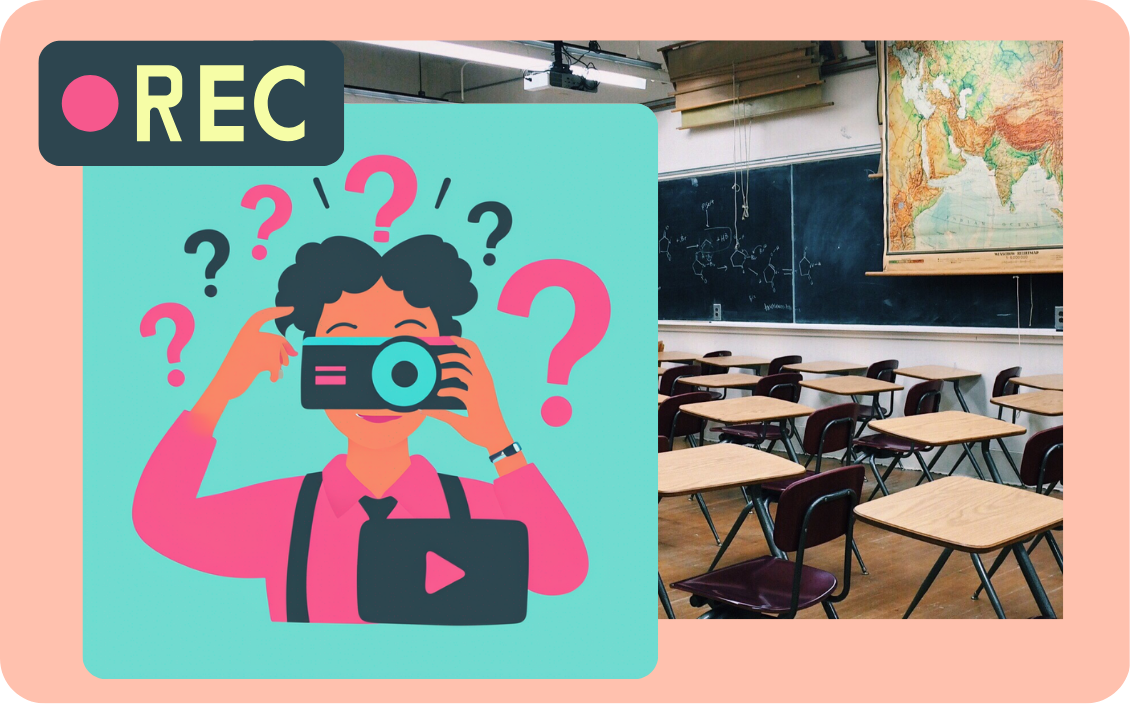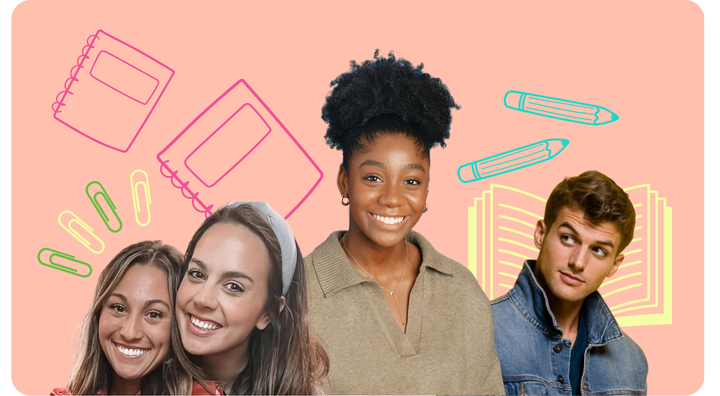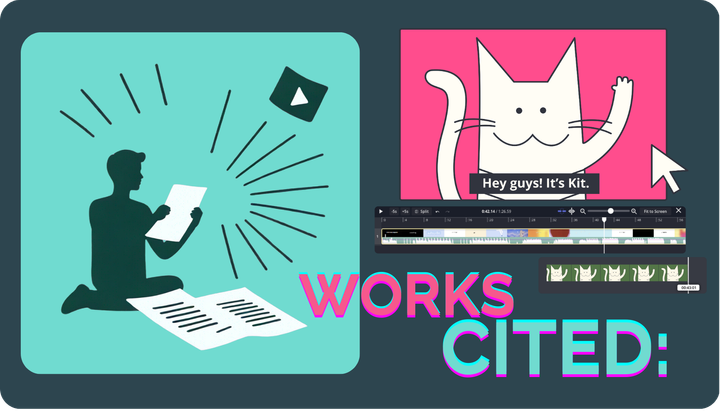Can I Record Videos at School Without Permission? A 2024 Guide for Teachers & Students
Can students record teachers without their knowledge? Can teachers record students? How do you get permission to record a class? This comprehensive guide explores policies and rules around making videos in the classroom.

As a former high school teacher, I've spent a lot of time thinking about video content and student wellbeing, especially since COVID. Whether documenting a cool science experiment to replay it in slow motion, saving the comments from a class discussion, or taping a funny presentation for students to rewatch later, video has always played an integral role in my teaching practice. However, privacy concerns & legal considerations often gave me pause while I was recording in the classroom.
Now, I work at Kapwing, supporting the community of educators and students who use our video editing tools. I’m not a lawyer, but I am invested in helping students and teachers create and connect with their communities. Video can support student creativity, improve accessibility, and bring learning into new spaces. Making videos at school can be an amazing way to share your ideas - it’s just important to be thoughtful and informed as you go! I’ve curated this guide to help clarify some of the rules around creating videos in class.

When am I legally allowed to take videos of students as a teacher?
Generally, teachers can record classes for student support and educational purposes without any legal issues. Some reasons you might do this include supporting an absent student, allowing students to review material, or allowing classwork to continue at home. (SCLS of California) Recordings should be for a limited period, and teachers should have a clear reason for taking the video.
Schools have to take “reasonable steps to protect student privacy” according to FERPA - this means that videos should not be accessible to third parties and should obscure any personal information about the students if possible. (FAQs on Videos under FERPA) Additionally, it's still best practice to ask students and parents for permission before recording anything in your class.
Some tips on recording in the classroom as a teacher:
- Do Ask Parents First. Create a parent permission form or customize a media release form template to make sure families are informed about your recording process. Outline what the videos will be used for, when they will be taken, and what details might be included.
- Remove Personally Identifiable Information (PII). According to FERPA, if a student is "featured" in a video, it may be considered part of the student's education record and therefore subject to increased privacy protections. Whenever possible, obscure or remove all student information from videos. With some simple video editing software, teachers can crop, redact, or blur the faces or identifying information in a video, and create moving blur sections so that PII remains concealed throughout the content.
- You can also use a screen recording software to record your voice and computer screen without using the webcam. A screen recorder or voiceover can help avoid student faces, information, and voices in the background.
- Keep Content Professional: Make sure your videos are appropriate and represent your school well. Schools can take disciplinary action if your video content is found to “disrupt the learning environment,” even if the video does not feature students.
- Teach Digital Citizenship & Media Creation: Common Sense Media has great lesson plans to help students learn to be safe and respectful online. Also, consider demonstrating your video creation skills via a screencast. Your students can learn from your content AND your video-making process!
- Educational Use vs. Social Media: FERPA does not actively prohibit teachers from recording social media material in class, but schools may still have their own rules, and additional consent forms and processes may be necessary. Check in with your school, your employee handbook, and students and parents before posting.

Can I as a student record teachers? Can students record other students?
If you’re a current student, your school likely already has a policy about appropriate recording. Check your student handbook, and ask school administrators for clarification if needed. Generally, you can record videos of yourself but should ask permission before recording teachers, administrators, or other students.
In some parts of the U.S. with "two-party consent" laws, recording, or taking video or audio of someone without their knowledge is considered illegal. This guide describes recording laws by state.
Some tips on making videos at school as a student:
- Get Consent: Ensure everyone in the video agrees to be recorded. Describe how you will edit the product and where you will post it to everyone involved. Wait for them to say yes before moving forward. If someone will be featured in a video you're making but doesn’t want to be in the final post, ask them if you can use tools like Kapwing to blur or crop them out.
- Choose Time and Place Wisely: Avoid recording during class time unless permitted. Stick to free periods or approved times.
- Get Final Product Approval: Ensure the finished version of the video is approved by everyone involved before posting. Adding effects, text, and images can be fun, but these additions can also change how someone feels about being involved.
- Have Fun: Creating videos can be fun and build skills - content creators and filmmakers all got their start somewhere. Learn & experiment with video editing to make something you're excited to share.

What to do if someone recorded you without your permission
If someone has recorded or posted a video of you at school without your consent, take the following steps:
- Ask for Removal: Request the person to delete the video or change its privacy settings.
- Notify School Authorities: If the person refuses to do as you ask, tell your school's administration right away. You might also involve parents, colleagues, or other adults for support. Make sure you know exactly what you're asking for: do you want the video deleted? Removed from public view? Something else?
- Document What Was Posted: Take screenshots (if you can see the video) and describe the recording in detail. Likely the video will be viewed as a part of the disciplinary process regardless, so it's important to collect your own evidence and represent the content accurately.
- Tell Anyone Potentially Affected by the video (family, other people at school, etc) about what happened. If the video has been posted, warn them the footage might be viewable to the public or third parties.
- Report the Video: Platforms like Instagram have tools to help you report the video and request its removal from public view.
Schools are public places, so always assume it's possible you are being recorded when you're on campus. However, even in one-party consent states, you have the right to address privacy concerns with your school and the person who made the recording.
Now, go make cool things!
Making videos at school should be fun, engaging, and add to your school community. Whether you’re a teacher or a student, it's key to know the rules and policies around video before you record - then, create something amazing and support your school in the process!









